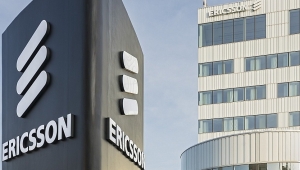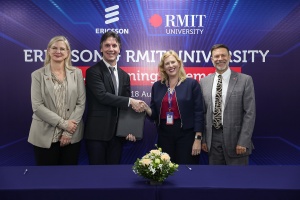Ericsson to accelerate Vietnam’s digitalisation journey via upskilling in 5G
Ericsson and RMIT University have signed an agreement to launch an AI lab at RMIT’s campus in Hanoi. How important is this to you, as well as to the development of qualified human resources in Vietnam?
 |
| Denis Brunetti, president of Ericsson in Vietnam, Myanmar, Cambodia, and Laos |
The joint initiative, which we hope will be launched by the end of this year, is an extension of the existing 5G education collaboration between RMIT and Ericsson that helps educate Vietnamese students on 5G and emerging technologies, such as AI, machine learning, blockchain, cloud computing, AR/VR and automation. It enables RMIT’s science, technology, and engineering students to actively participate and contribute to the country’s digital economy and digital transformation journey.
The partnership is also an industrial research and education initiative focusing on the application of AI to Industry 4.0 initiatives enabled by the roll-out of 5G in Vietnam. Through this initiative, Ericsson and RMIT will support industry, academia, and community partners to create and implement AI solutions that will spearhead the adoption of Industry 4.0 across a multitude of industries.
In Vietnam, the government has targeted clear objectives to accelerate the adoption of Industry 4.0 as part of its national strategy for digital transformation.
This lab builds on a previously launched 5G education collaboration with RMIT in Vietnam and represents a significant step in building a high-tech industry-ready workforce in Vietnam through strategic industry-academia partnerships, whilst helping further advance the startup and innovation ecosystem across the nation.
The 5G-ready young talent and AI applications that this collaboration expects to produce will serve to accelerate Vietnam’s Industry 4.0 agenda, as well as its ambition to become an AI hub in ASEAN by 2030. It will drive and create the next wave of sustained and inclusive socioeconomic development in Vietnam, enabled by sci-tech and innovation.
Which sectors will benefit most from the initiative?
The collaboration’s activities are expected to include work integrated training/learning in 5G, AI/ML, AR/VR, automation, cloud and edge computing, blockchain, and related technologies, coupled with the ambition to jointly research, create, and implement AI applications that can serve the needs of industries across Vietnam, such as manufacturing, energy, education, transport, and logistics.
In addition, the lab will enable Ericsson and RMIT to connect with community partners over time to potentially create a broader ecosystem in AI and communications technology, leveraging 5G as a critical national infrastructure.
It will also contribute to further advancing the startup and innovation ecosystem across the nation, whilst also nurturing and developing the high-tech human capital capabilities of the workforce of the future.
How far can this Ericsson and RMIT cooperation go over the next few years and beyond?
The collaboration began in late 2021 with the launch of our Ericsson Educate online platform in Vietnam, which has already been delivering 5G training for RMIT students in the School of Science, Engineering, and Technology. This collaboration will ensure that graduates have the practical skills necessary to succeed in fast-evolving business environments, equipping them with the capabilities and competencies that are required for the jobs of the future.
The collaboration with RMIT University will further support Vietnam’s ambition of accelerating the development of IT and STEM-related human capital capabilities across the nation. With around three-quarters of jobs globally requiring STEM-based competencies by 2050, Vietnam will be well positioned to meet the needs of the future workforce, whilst also driving innovation and startup entrepreneurship to create new industries, companies, and jobs.
Upskilling the workforce is one of Vietnam’s top priorities in its digital transformation journey. How does Ericsson Educate help support the country’s efforts in this regard?
We are helping prepare the country for 5G by educating young people. We opened the Ericsson Educate platform to RMIT students in addition to collaborating with the university for guest lectures, research projects, internships, and industry projects as well as creating relevant opportunities for students to benefit from our technology and 5G leadership.
Ericsson Educate is a digital skills portal that provides access to learning material on key technologies. The collaboration to include content from the portal provides students and lecturers with access to quality digital learning resources that draw on our expertise in telecommunications and ICT. This is the first formal collaboration for this programme in Vietnam.
The initiative’s content will be provided without cost by Ericsson during the collaboration period, which has the potential to reach up to 1,300 students. Content from the platform is being utilised to complement RMIT’s science, engineering, and technology courses for university-level students.
The 5G-ready young talent that this collaboration will produce will also serve to accelerate Vietnam’s Industry 4.0 agenda and boost the country’s digital transformation initiatives.
 | 5G growth continues in Southeast Asia 5G subscriptions continue to grow in Southeast Asia and Oceania highlights, with 5G subscriptions forecast to reach around 430 million by the end of 2028 and to contribute 34 per cent of all mobile subscriptions, according to the June 2023 edition of the Ericsson Mobility Report. |
 | Building more sustainable mobile networks with 5G Today, we are at the epicentre of a powerful trend where anything that can go wireless will go wireless. Digitalisation is already a driving force in every industry across our planet, and mobile networks have been a key enabler of digitalisation, which puts our industry at the centre of a powerful trend. |
 | Ericsson and RMIT University to establish AI Lab in Vietnam Ericsson and RMIT University have elevated their cooperation to a new height with an agreement signed on August 18 for the launch of the RMIT & Ericsson AI Lab at RMIT's campus in Hanoi. |
What the stars mean:
★ Poor ★ ★ Promising ★★★ Good ★★★★ Very good ★★★★★ Exceptional
Themes: Digital Transformation
- Dassault Systèmes and Nvidia to build platform powering virtual twins
- Sci-tech sector sees January revenue growth of 23 per cent
- Advanced semiconductor testing and packaging plant to become operational in 2027
- BIM and ISO 19650 seen as key to improving project efficiency
- Viettel starts construction of semiconductor chip production plant
Related Contents
Latest News
More News
- State corporations poised to drive 2026 growth (February 03, 2026 | 13:58)
- Why high-tech talent will define Vietnam’s growth (February 02, 2026 | 10:47)
- FMCG resilience amid varying storms (February 02, 2026 | 10:00)
- Customs reforms strengthen business confidence, support trade growth (February 01, 2026 | 08:20)
- Vietnam and US to launch sixth trade negotiation round (January 30, 2026 | 15:19)
- Digital publishing emerges as key growth driver in Vietnam (January 30, 2026 | 10:59)
- EVN signs key contract for Tri An hydropower expansion (January 30, 2026 | 10:57)
- Vietnam to lead trade growth in ASEAN (January 29, 2026 | 15:08)
- Carlsberg Vietnam delivers Lunar New Year support in central region (January 28, 2026 | 17:19)
- TikTok penalised $35,000 in Vietnam for consumer protection violations (January 28, 2026 | 17:15)

 Tag:
Tag:




















 Mobile Version
Mobile Version